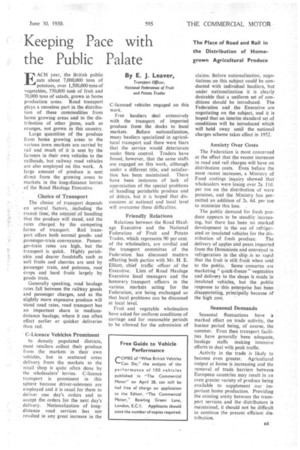Keeping Pace with the Public Palate
Page 59

If you've noticed an error in this article please click here to report it so we can fix it.
By E. 3. Leaver,
Transport Officer, National Federation of Fruit and Potato Trades
EACH year, the British public eats about 7,000,000 tons of
• potatoes, over 1,500,000 tons of vegetables, 750,000 ton S of fruit and 70,000 tons of salads, grown in home production areas. Road transport plays a ceaseless part in the distribution of these commodities from home growing areas and in the distribution of other items, such as oranges, not grown in this country.
Large quantities of the produce from home growing areas to the various town markets are carried by rail and much of it is sent by the farmers in their own vehicles to the railheads, but railway road vehicles are also employed on this work. A large amount of produce is sent direct from the growing areas to markets in the long-distance lorries of the Road Haulage Executive.
Choice of Transport
The choice of transport depends on several, factors, including the transit time, the amount of handling that the produce will stand, and the sates charged by the competing forms of transport. Rail transport offers both normal goodsand passenger-train conveyance. Passenger-train rates are high, but the transport is quick. Highly perishable and dearer foodstuffs such as soft fruits and cherries are sent by passenger train, and potatoes, root crops and hard fruits largely by goods train.
Generally speaking, road haulage rates fall between the railway goods and passenger charges, and as the slightly more expensive produce will stand road rates, road transport has an important share in mediumdistance haulage, where it can often effect earlier or quicker deliveries than rail.
C-Licence Vehicles Prominent In densely populated districts, most retailers collect their produce from the markets in their own vehicles, but in scattered areas delivery from the markets to the retail shop is quite often done by the wholesalers' lorries. C-licence transport is prominent in this sphere because driver-salesmen are employed and it is usual for them to deliver one day's orders and to accept the orders for the next day's delivery. Nationalization of longdistance road services has not resulted in any great increase in the
C-licensed vehicles engaged on this work.
Free hauliers deal extensively with the transport of imported produce from the docks to local markets. Before nationalization, many hauliers specialized in agricultural transport and there were fears that the service would deteriorate under State control. Traders have found, however, that the same staffs are engaged on this work, although under a different title, and satisfaction has been maintained. There have been instances of lack of appreciation of the special problems of handling perishable produce and of delays, but it is hoped that discussions at national and local level will overcome these difficulties.
Friendly Relations Relations between the Road Haulage Executive and the National Federation of Fruit and Potato Trades, which represents 90 per cent. of the wholesalers, are cordial and the transport committee of the Federation has discussed matters affecting both parties with Mr. H. E. Elliott, chief traffic officer of the Executive. Lists of Road Haulage Executive local managers and the honorary transport officers in the various markets acting for the Federation, are being exchanged so that local problems can be discussedat local level.
Fruit and vegetable wholesalers have asked for uniform conditions of carriage and for reasonable periods to be allowed for the submission of claims. Before nationalization, negotiations on this subject could be conducted with individual hauliers, but under nationalization it is clearly desirable that a uniform set of conditions should be introduced. The Federation and the Executive are negotiating on the subject, and it is hoped that an interim standard set of conditions will be introduced which will hold sway until the national charges scheme takes effect in 1952.
Anxiety Over Costs The Federation is most concerned at the effect that the recent increases in road and rail charges will have on distribution costs. Even before the most recent increases, a Ministry of Food costings inquiry showed that' wholesalers were losing over 2s. 11d. per ton on the distribution of ware potatoes, and the Ministry has permitted an addition of 2s. 6d. per ton to minimize this loss. .
The public demand for fresh produce appears to be steadily increasing, but there has been no marked development in the use of refrigerated or insulated vehicles for the dis
tribution of fresh produce. The delivery of apples and pears imported from the Dominions and conveyed in refrigeration in -the ship .is so rapid that the fruit is Still fresh When soldto the public. Some concerns are marketing "quick-freeze" vegetables and delivery to the shops is made in insulated vehicles, but the public response to this enterprise has been disappointing, principally because of the high cost.
Seasonal Demands Seasonal fluctuations have 4 marked effect on trade activity, the busiest period being, of course, the summer. Even then transport facilities have generally been adequate, haulage staffs making intensive efforts to deal with peak traffic.
Activity in the trade is likely to become even greater. Agricultural output at home is increasing and the removal of trade barriers between European countries may result in an even greater variety of produce being available to supplement our important home production. Providing the existing amity between the transport services and the distributors is maintained, it should not be difficult to continue the present efficient distribution.




























































































































